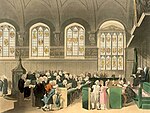| Equitable doctrines |
|---|
 |
| Doctrines |
| Defences |
| Equitable remedies |
| Related |
Knowing receipt is an English trusts law doctrine for imposing liability on a person who has received property that belongs to a trust, or which was held by a fiduciary, having known that the property was given to them in breach of trust. To be liable for knowing receipt, the claimant must show, first, a disposal of his trust assets in breach of fiduciary duty; second, the beneficial receipt by the defendant of assets which are traceable as representing the assets of the claimant; and third, knowledge on the part of the defendant that the assets he received are traceable to a breach of fiduciary duty.[1]
"Knowing receipt" is also sometimes called "unconscionable receipt"[2] because of its theoretical foundation in the doctrine of unconscionability. The contrary view is that knowing receipt is, or ought to be, part of a broader doctrine of ignorance triggering a claim for unjust enrichment. On this view, anyone who receives property that was given away in breach of trust has a strict duty to repay the value, unless they have committed a wrong, or have changed their position after the receipt. This model suggests that knowledge is not exclusively relevant for liability.
The underlying principle of knowing receipt is beneficial receipt of D is unjust enrichment at the expense of the rightful owner. In Royal Brunei Airlines Sdn Bhd v Tan, knowing receipt is characterized as restitution-based liability (as opposed to accessory liability).
- ^ El Ajou v Dollar Land Holdings [1994] 2 All ER 685, 700
- ^ G. Thomas and A Hudson, The Law of Trusts (OUP, 2010) 900-920
